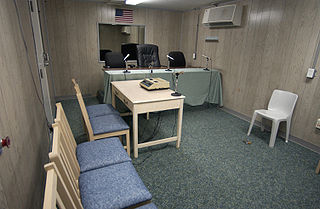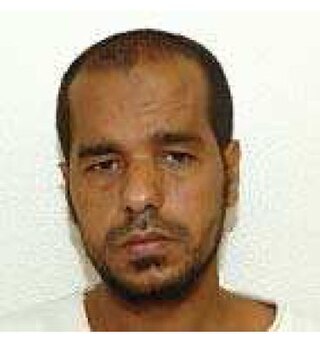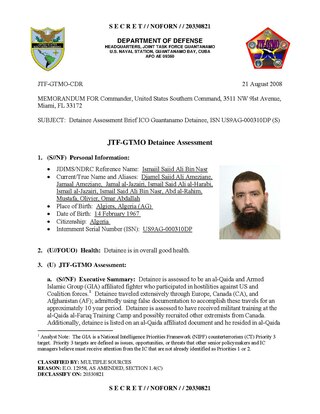Related Research Articles

Michael Ratner was an American attorney. For much of his career, he was president of the Center for Constitutional Rights (CCR), a non-profit human rights litigation organization based in New York City, and president of the European Center for Constitutional and Human Rights (ECCHR) based in Berlin.

The Combatant Status Review Tribunals (CSRT) were a set of tribunals for confirming whether detainees held by the United States at the Guantanamo Bay detention camp had been correctly designated as "enemy combatants". The CSRTs were established July 7, 2004 by order of U.S. Deputy Secretary of Defense Paul Wolfowitz after U.S. Supreme Court rulings in Hamdi v. Rumsfeld and Rasul v. Bush and were coordinated through the Office for the Administrative Review of the Detention of Enemy Combatants.
Hamdan v. Rumsfeld, 548 U.S. 557 (2006), is a United States Supreme Court case in which the Court held that military commissions set up by the Bush administration to try detainees at Guantanamo Bay violated both the Uniform Code of Military Justice (UCMJ) and the Geneva Conventions ratified by the U.S.

Salim Ahmed Salim Hamdan is a Yemeni man, captured during the invasion of Afghanistan, declared by the United States government to be an illegal enemy combatant and held as a detainee at Guantanamo Bay from 2002 to November 2008. He admits to being Osama bin Laden's personal driver and said he needed the money.
Muhibullah or Moheb Ullah Borekzai is a citizen of Afghanistan who was held in extrajudicial detention in the United States' Guantanamo Bay detention camps, in Cuba. His Guantanamo Internment Serial Number was 546. American intelligence analysts estimate that Muhibullah was born in 1982, in Shah Wali Koot, Afghanistan.

Djamel Saiid Ali Ameziane is an Algerian citizen, and former resident of Canada, who was held in extrajudicial detention in the United States Guantanamo Bay detention camps, in Cuba.

Charles D. Swift is an American attorney and former career Navy officer, who retired in 2007 as a Lieutenant Commander in the Judge Advocate General's Corps. He is most noted for having served as defense counsel for Salim Ahmed Hamdan, a detainee from Yemen who was the first to be charged at Guantanamo Bay; Swift took his case to the US Supreme Court. In 2005 and June 2006, the National Law Journal recognized Swift as one of the top lawyers nationally because of his work on behalf of justice for the detainees.

Muhammad Ali Abdallah Muhammad Bwazir is a citizen of Yemen, once held in extrajudicial detention in the United States Guantanamo Bay detainment camps, in Cuba. Bwazir's Guantanamo Internment Serial Number was 440. American intelligence analysts estimate he was born in 1980, in Hawra', Yemen.

Mohammed Ahmad Said Al Edah is a citizen of Yemen who was held in the United States' Guantanamo Bay detainment camps, in Cuba, for fourteen and a half years. His Internment Serial Number is 33. Joint Task Force Guantanamo counter-terrorism analysts estimate he was born in 1962, in Hay al-Turbawi Ta'iz, Yemen.

Matthew Mark Diaz is a former active-duty Lieutenant Commander (LCDR) and Judge Advocate General's Corps (JAGC) officer in the United States Navy. In mid-to-late 2004, Diaz served a six-month tour of duty in Guantanamo Bay, Cuba as deputy director of the detention center's legal office. Early in 2005 as LCDR Diaz was concluding his tour, he sent an anonymous greeting card to The Center for Constitutional Rights, a New York civil liberties and human rights group. The card contained the names of the detainees held at the Guantanamo Bay detention camp. In July 2006, the United States government formally charged Diaz in a military court with five criminal counts related to the sending of these names, the most serious being that he intended to harm national security or advantage a foreign nation, a violation of the Espionage Act. In May 2007, he was convicted by a seven-member jury of military officers on 4 of 5 counts. He served a 6-month prison sentence and was dismissed from the military.

Moath Hamza Ahmed al-Alwi is a citizen of Yemen, held in extrajudicial detention in the United States Guantanamo Bay detainment camps, in Cuba. His detainee ID number is 28. Guantanamo analysts estimated he was born in 1977, in Al Hudaydah, Yemen.
Boumediene v. Bush, 553 U.S. 723 (2008), was a writ of habeas corpus petition made in a civilian court of the United States on behalf of Lakhdar Boumediene, a naturalized citizen of Bosnia and Herzegovina, held in military detention by the United States at the Guantanamo Bay detention camps in Cuba. The case underscored the essential role of habeas corpus as a safeguard against government overreach, ensuring that individuals cannot be detained indefinitely without the opportunity to challenge the legality of their detention. Guantánamo Bay is not formally part of the United States, and under the terms of the 1903 lease between the United States and Cuba, Cuba retained ultimate sovereignty over the territory, while the United States exercises complete jurisdiction and control. The case was consolidated with habeas petition Al Odah v. United States. It challenged the legality of Boumediene's detention at the United States Naval Station military base in Guantanamo Bay, Cuba as well as the constitutionality of the Military Commissions Act of 2006. Oral arguments on the combined cases were heard by the Supreme Court on December 5, 2007.
Al Odah v. United States is a court case filed by the Center for Constitutional Rights and co-counsels challenging the legality of the continued detention as enemy combatants of Guantanamo detainees. It was consolidated with Boumediene v. Bush (2008), which is the lead name of the decision.
In United States law, habeas corpus is a recourse challenging the reasons or conditions of a person's detention under color of law. The Guantanamo Bay detention camp is a United States military prison located within Guantanamo Bay Naval Base. A persistent standard of indefinite detention without trial and incidents of torture led the operations of the Guantanamo Bay detention camp to be challenged internationally as an affront to international human rights, and challenged domestically as a violation of the Due Process Clause of the Fifth and Fourteenth amendments of the United States Constitution, including the right of petition for habeas corpus. On 19 February 2002, Guantanamo detainees petitioned in federal court for a writ of habeas corpus to review the legality of their detention.
Kristine Huskey is an American lawyer. Huskey is notable because she volunteered to help defend Guantanamo detainees. Huskey is the author of "Standards and Procedures for Classifying "Enemy Combatants": Congress, What Have You Done?"
Scott Horton is an American attorney known for his work in human rights law and the law of armed conflict, as well as emerging markets and international law. He graduated Texas Law School in Austin with a JD and was a partner in a large New York law firm, Patterson Belknap Webb & Tyler. He "has advised sovereigns on the pursuit of kleptocratic predecessors." In April 2007, he joined Harper's Magazine as a legal affairs and national security contributor, and he currently authors the No Comment blog at Harper's Online. Horton has also written for The American Lawyer, and The Daily Beast and has been interviewed on Antiwar Radio. and the John Batchelor Show.
Guantanamo Bay detainees have been allowed to initiate appeals in Washington, D.C., courts since the passage of the Detainee Treatment Act of 2005 (DTA) closed off the right of Guantanamo captives to submit new petitions of habeas corpus. It substituted a right to a limited appeal to Federal Courts of appeal in Washington, D.C. The Act allowed detainees to challenge whether their Combatant Status Review Tribunals had correctly followed the rules laid out by the Department of Defense.

Shayana D. "Shane" Kadidal is an American lawyer and writer. Kadidal has worked at the Center for Constitutional Rights in New York City since 2001, and is senior managing attorney of the Guantánamo Global Justice Initiative there, coordinating legal representation for the captives held in extrajudicial detention in the United States' Guantanamo Bay detention camps, in Cuba. Previously a writer on patent, drug and obscenity law, since 2001 he has played a role in various notable human rights cases, including:

Tina Monshipour Foster is an Iranian-American lawyer and director of the International Justice Network.
References
- ↑ Barbara Olshansky, Dave Lindorff (2 May 2006). The Case for Impeachment: The Legal Argument for Removing President George W. Bush from Office . ISBN 0-312-36016-9.
- 1 2 Jeannie Shawl (May 9, 2007). "Jury selection begins in Guantanamo names court-martial". The Jurist. Archived from the original on 16 May 2007. Retrieved 2015-05-24.
- ↑ Kate Wiltrout (August 29, 2006). "Navy lawyer once posted at Cuba base is charged". The Virginian-Pilot. Archived from the original on August 13, 2013. Retrieved 2008-06-09. Mirror.
- ↑ "Response to Government motion requesting an Article 39a session and Defense motion to suppress evidence (.doc)". Department of the Navy General Court-Martial Navy and Marine Corps Trial Judiciary Central Judicial Circuit. March 12, 2007. Archived from the original on February 5, 2007. Retrieved 2007-05-09.
- 1 2 "IJN Legal Director to Head Stanford Human Rights Clinic". International Justice Network. July 9, 2007. Archived from the original on January 6, 2009. Retrieved 2008-06-09.
- ↑ Ana Diaz-Hernandez (November 26, 2007). "Olshansky says rights subverted". Stanford Daily. Archived from the original on 2008-02-07. Retrieved 2008-06-09.
- ↑ "Spring 2008 Events: Defending the Guantanamo Bay Detainees". Stanford Daily. Archived from the original on 5 June 2008. Retrieved 2008-06-09.
- ↑ "Barbara Olshansky to Join Stanford Law School as the Leah Kaplan Visiting Professor in Human Rights". Business Wire. July 9, 2007. Retrieved 2008-06-09.
- ↑ Kawkab al-Thaibani (July 24, 2007). "Yemeni detainee can continue his case". Yemen Observer. p. 1. Archived from the original on February 10, 2013. Retrieved 2008-06-09.
{{cite news}}: CS1 maint: unfit URL (link) - ↑ "Maryland Law | Barbara Olshansky". Archived from the original on 2010-06-13. Retrieved 2010-10-18.